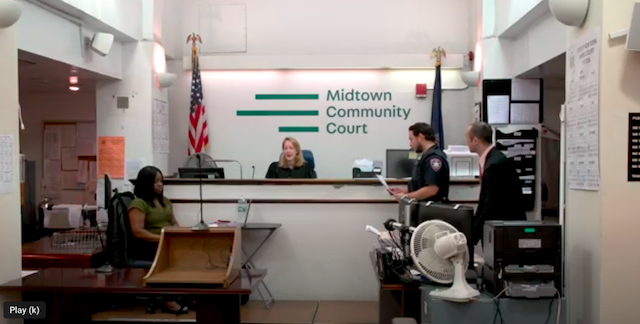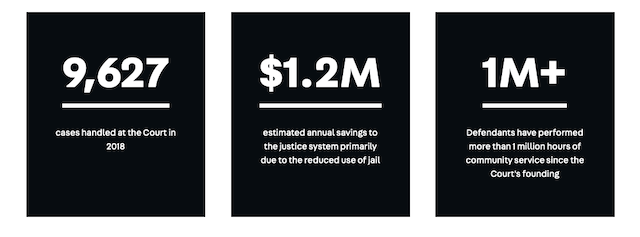
BY SCOTT STIFFLER | Conceived and achieved as a way in which non-violent offenders can avoid incarceration by accessing social services and performing community service, Midtown Community Court (MCC; 314 W. 54th St.) operated continuously from 1993 until in-person proceedings were suspended during the peak COVID period. It reopened in March of last year, but only at one-fifth of its former capacity.
That’s expected to change by mid-March, when MCC operations will expand by either one or two days a week. “This would be to accommodate the young adult calendar, 18- to 25-year-olds who received DATs (desk appearance tickets) for non-violent misdemeanors,” said Lucian Chalfen, Director of Public Information, New York State Unified Court System. “We are in the process of working out the final details with both the NYPD and Manhattan District Attorney,” he noted.
Such news is warmly welcomed—albeit overdue—for those seeking to reduce the volume and intensity of quality of life crimes (prostitution, drug possession) and misdemeanor offenses (assault, petty theft) that consistently top the concerns raised by residents at Chelsea’s monthly 10th Precinct Community Council and quarterly Build the Block meetings. NYS Senator Brad Hoylman-Sigal and NYC Council Member Erik Bottcher have often told Council attendees they consider MCC’s full-time restoration as a necessary component in tackling Chelsea’s specific crime patterns.
In a September 6, 2022 letter sent to Judges Cannataro and Marks and signed by electeds including Hoylman-Sigal, Bottcher, and Manhattan Borough President Mark Levine, the collective called for “a concrete plan to re-open Midtown Community Court to…full capacity,” calling it “a proven tool that can have positive impact on public safety” and noting the absence of its peak-capacity presence has “hamstrung individuals’ ability to access support and services as they move through the criminal justice system.”

In the meantime, MCC (previously a Monday through Friday occurrence) is in session Fridays only. Presided over by Judge John Wang, it functions primarily as a Misdemeanor Mental Health Court (MMHC). Individuals find their way to MMHC after their case is arraigned Downtown, but before a plea is entered. All involved parties—judge, prosecutor, defense attorney—must recognize the person has a mental health issue and consider them a promising candidate for MMHC. (The individual facing charges must agree to this arrangement as well.)
MMHC operates in a manner that, while hardly casual, has “a different feel than downtown,” notes MCC Project Director Danielle Mindess. “Probably the first person they talk to is a social worker” who will greet them and give them an overview of protocol. Then they’re seen in an initial court appearance by Judge Wang, who will describe what it will mean to be part of MMHC. If the referred individual agrees to participate, they’ll have an intake session with a social worker, during which, Mindess notes, “They will co-create a plan for their mandated engagement with us. It could be meeting with a social worker, drug treatment, and/or joining a program group with other participants.”
Mindess says that of the 100+ referrals received since its March 2022 inception, MMHC has an “extremely good retention rate,” noting, “once they show up and meet with a social worker, they will generally follow through” to completion, and sometimes even opt for voluntary programming after completing their mandated activities.
Although MCC is currently in session only once a week (pending mid-March upgrades), their programming is offered five days a week, Monday through Friday. It includes Project Reset. “When somebody gets a desk appearance ticket,” notes Mindess, they will get an outreach saying, ‘If you come to us [Project Reset] and participate in one session of programming, the District Attorney will decline to prosecute your case.’ ” Other programming options include Up Next, a fatherhood and workforce development program for non-custodial fathers looking to reconnect or strenthen bonds with their children and co-parent. And the Community First program deploys navigators to engeage with people living or spending time on the street in the Times Square area. Once engaged, they’re offered immediate need resrouces and the opportunity to connecrt with longer-term services.
By meeting participants where they are and giving them the means to arrive at where they strive to be, Midtown Community Court plays a signficant part in removing individuals from the criminal justice system–and hopes to be back in that business, soon, a full five days a week. Meantime, Judge Wang has been spending his “off” days connecting with leadership from the six NYPD precincts within MCC’s cachement area: The 13th, 17th, 20th, Midtown North, Midtown South, and Chelsea’s 10th precinct, where Wang recently sat down with its Commanding Officer, Captain Robert Gault.
Note: No cachement tour is complete without a visit to the 10th Precinct’s Community Council, whose citizen-run meetings are held on the last Wednesday of the month, via Zoom. To register for the Wednesday, February 22, 7pm meeting, click here. Meeting ID: 881 0340 8900. Passcode: 384419. To attend by phone, dial 646-558-8656.
–END–
Chelsea Community News is an independent, hyperlocal news, arts, events, info, and opinion website made possible with the help of our awesome advertisers and the support of our readers. Our Promise: Never a paywall, no pop-up ads, all content is FREE. With that in mind, if circumstances allow, please consider taking part in our GoFundMe campaign (click here). To make a direct donation, give feedback, send a Letter to the Editor, or contact our founder/editor, send an email to Scott Stiffler, via scott@chelseacommunitynews.com.
To join our subscriber list, click here. It’s a free service provding regular (weekly, at least) Enewsletters containing links to recently published content. Subscribers also will be sent email with “Sponsored Content” in the subject line. That means it’s an exclusive message from one of our advertisers, whose support, like yours, allows us to offer all content free of charge.

Pingback: Midtown Community Court Expands to Include Young Adult (ages 18-25) Calendar - Chelsea Community News